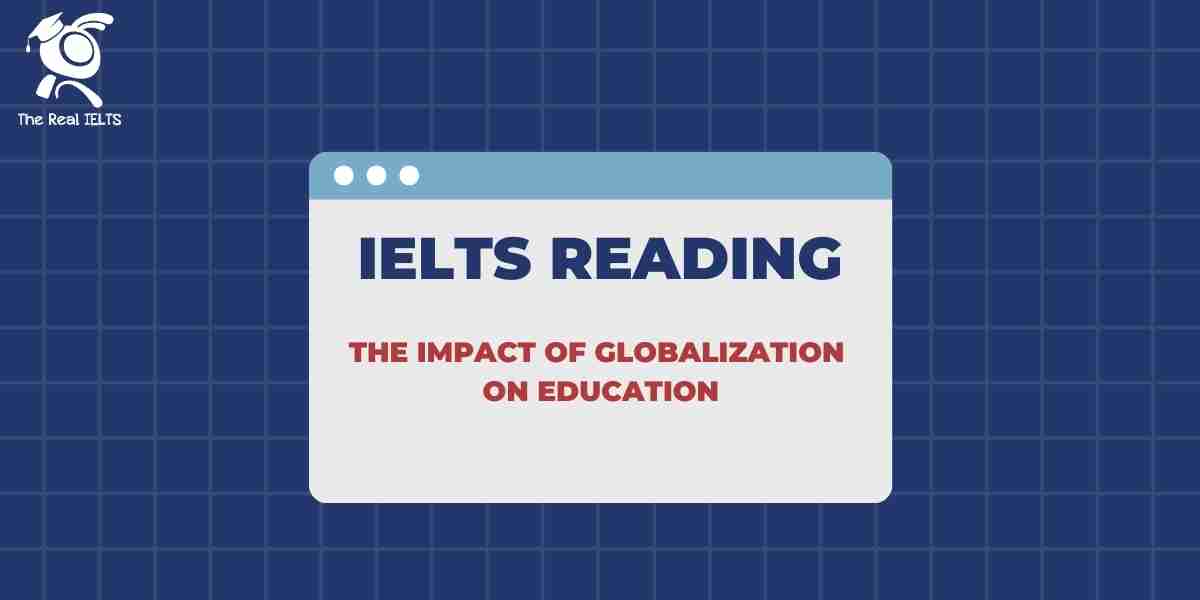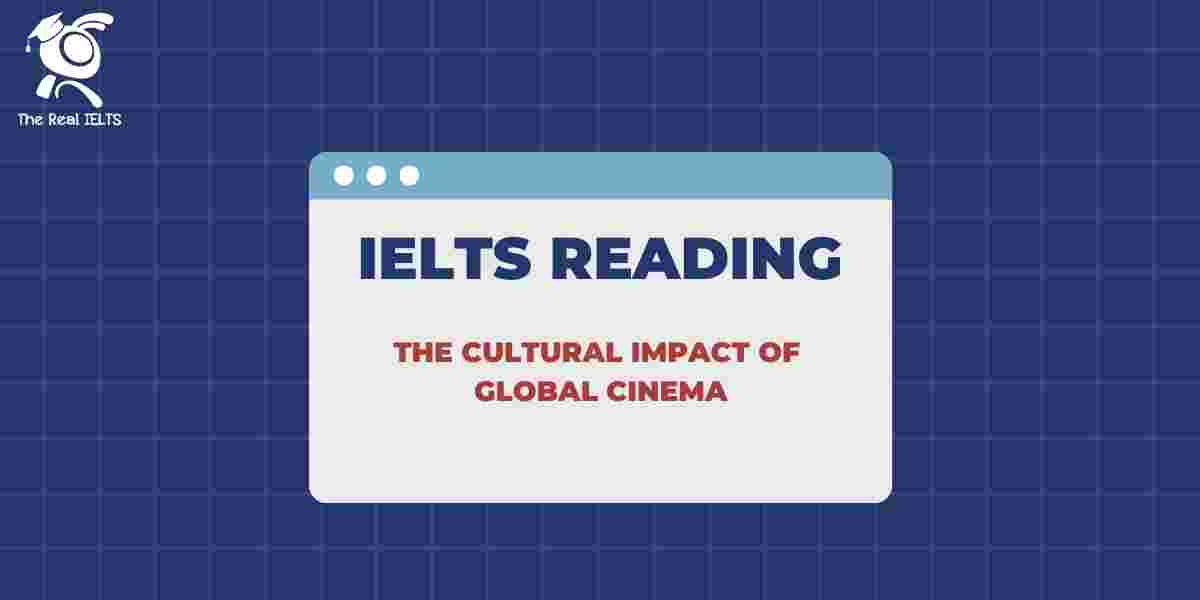Đề thi IELTS Reading có tiêu đề “The Impact of Globalization on Education”
Nhớ đọc thêm các bài luyện thi IELTS nhé.
IELTS Reading:”The Impact of Globalization on Education“
The Impact of Globalization on Education
Globalization has become one of the most influential forces shaping the modern world, touching upon various facets of life, from economics and politics to culture and technology. One area where its effects are particularly evident is education. The process of globalization has brought about significant changes in educational systems worldwide, influencing curricula, teaching methods, student mobility, and the overall purpose of education itself. While there are numerous benefits to the global interconnectedness of education, there are also notable challenges that must be addressed to ensure that education serves as an equalizing force in society.
One of the most apparent impacts of globalization on education is the increased access to information and resources. In the past, access to knowledge was often limited by geography, language, or socioeconomic status. However, with the advent of the internet and digital technologies, students and educators from all corners of the globe now have unprecedented access to a wealth of information. Online courses, research databases, and educational platforms like Coursera, Khan Academy, and edX offer free or affordable learning opportunities to millions of people worldwide. This democratization of education enables individuals to learn at their own pace, explore new fields, and enhance their skills without the constraints of time or location.
Moreover, globalization has facilitated student mobility, allowing individuals to pursue education beyond their home countries. Universities in developed countries, such as the United States, the United Kingdom, Canada, and Australia, have seen a significant influx of international students seeking higher education. This trend not only fosters a diverse learning environment but also enables the exchange of ideas and cultures. Students gain exposure to different perspectives and ways of thinking, enriching their academic experience and enhancing their global awareness. In addition, international education provides opportunities for students to develop language skills, build global networks, and increase their competitiveness in the global job market.
Another significant impact of globalization on education is the transformation of curricula and teaching methods. As economies become more interconnected, the demand for skills that transcend national borders has increased. Educational institutions are now placing a stronger emphasis on subjects like information technology, business, and communication to prepare students for the global economy. Furthermore, the integration of cross-cultural competencies, global citizenship education, and sustainability into curricula reflects the growing recognition of the need to equip students with skills that are relevant in a globally connected world. Schools and universities are also adopting more student-centered and interactive teaching methods, such as project-based learning and collaborative problem-solving, to encourage critical thinking and innovation.
However, globalization’s influence on education is not without challenges. One of the most pressing concerns is the potential for cultural homogenization. As educational systems around the world increasingly adopt Western curricula and teaching methods, there is a risk that local cultures, languages, and traditions may be marginalized or lost. This can lead to a form of educational imperialism, where dominant cultures impose their values and knowledge systems on others, reducing the diversity of educational experiences. To counteract this, there is a growing movement to promote inclusive and culturally relevant education that respects and integrates local knowledge and perspectives.
Another challenge associated with globalization in education is the widening inequality between developed and developing countries. While globalization has increased access to educational resources for many, it has also exacerbated disparities between countries with well-established education systems and those with limited infrastructure. Developing countries often lack the financial resources, technology, and trained educators needed to fully benefit from the opportunities presented by globalization. As a result, students in these regions may struggle to compete with their counterparts in more affluent countries. This inequality can perpetuate a cycle of poverty and limit the potential for social mobility.
Additionally, the commercialization of education is a growing concern in the context of globalization. As education becomes increasingly viewed as a commodity, there is a risk that the focus on profit may undermine the quality of education. Universities, particularly in developed countries, may prioritize attracting international students for financial gain rather than ensuring the best possible learning experience. Similarly, the proliferation of for-profit educational institutions and online platforms may lead to the commodification of knowledge, where education is driven by market demands rather than the pursuit of academic excellence and critical thinking.
Despite these challenges, globalization also offers opportunities for collaboration and innovation in education. International partnerships between universities, research institutions, and governments have the potential to address some of the global challenges facing education. For example, initiatives like the United Nations’ Sustainable Development Goal 4, which aims to ensure inclusive and equitable quality education for all, highlight the importance of global cooperation in addressing educational disparities. By sharing best practices, resources, and technology, countries can work together to improve educational outcomes and create a more equitable global education system.
In conclusion, globalization has had a profound impact on education, bringing both opportunities and challenges. It has expanded access to knowledge, facilitated student mobility, and transformed curricula to better prepare students for the global economy. However, it has also raised concerns about cultural homogenization, inequality, and the commercialization of education. To fully harness the benefits of globalization while mitigating its negative effects, educational systems must be adaptable, inclusive, and responsive to the needs of a diverse and interconnected world. Ultimately, education should serve as a bridge between cultures, fostering mutual understanding, respect, and cooperation in an increasingly globalized society.
Đề bài thi IELTS Reading
1. Multiple Choice Questions (10 câu)
- What has globalization primarily influenced in education?
- A) Teacher training methods
- B) Student behavior
- C) Curricula and teaching methods
- D) School funding
- Which of the following is mentioned as a benefit of student mobility?
- A) Increased economic opportunities
- B) Higher graduation rates
- C) Exposure to different perspectives and cultures
- D) Easier access to scholarships
- What is one of the key challenges of globalization in education?
- A) Lack of internet access
- B) Cultural homogenization
- C) The decline of traditional universities
- D) Increased competition among students
- Which of the following is a platform that offers free or affordable learning opportunities?
- A) LinkedIn
- B) Coursera
- C) YouTube
- D) Amazon
- How has globalization impacted the content of school curricula?
- A) Emphasis on local history
- B) Focus on global citizenship and sustainability
- C) More emphasis on traditional values
- D) Less focus on mathematics
- What is a potential downside of viewing education as a commodity?
- A) Students may prioritize social media
- B) Schools may lack discipline
- C) The focus may shift from academic excellence to financial profit
- D) Teachers may become too focused on research
- What is one of the primary concerns of developing countries in education due to globalization?
- A) Inability to adopt Western teaching methods
- B) Lack of educational infrastructure
- C) Low student attendance rates
- D) High teacher turnover
- What is one of the main advantages of international cooperation in education?
- A) Increasing political influence
- B) Reducing academic standards
- C) Sharing best practices and improving educational outcomes
- D) Lowering tuition fees
- What does the term “educational imperialism” refer to?
- A) A country’s dominance in the field of education research
- B) The imposition of dominant cultures’ educational practices on others
- C) The global spread of online courses
- D) The role of governments in controlling education
- What does the United Nations’ Sustainable Development Goal 4 aim to achieve?
- A) More online courses globally
- B) Increased international student mobility
- C) Inclusive and equitable quality education for all
- D) More funding for universities in developing countries
2. True/False/Not Given (5 câu)
- Globalization has made access to education more unequal across countries.
- True
- False
- Not Given
- International students often struggle to adapt to new cultural environments.
- True
- False
- Not Given
- Some universities are more focused on attracting international students for financial reasons.
- True
- False
- Not Given
- Project-based learning is replacing traditional lectures in many universities.
- True
- False
- Not Given
- Globalization has led to a greater focus on sustainability in education.
- True
- False
- Not Given
3. Yes/No/Not Given (5 câu)
- The author believes that globalization has only positive effects on education.
- Yes
- No
- Not Given
- The author suggests that students in developed countries have an advantage over those in developing countries.
- Yes
- No
- Not Given
- The author argues that technology is the most important factor in modern education.
- Yes
- No
- Not Given
- The author believes that for-profit educational institutions compromise the quality of education.
- Yes
- No
- Not Given
- The author supports the idea of international collaboration to solve global educational challenges.
- Yes
- No
- Not Given
4. Matching Information (5 câu)
Match the following impacts with the corresponding sections of the text:
- Increased access to online resources
- A) Cultural homogenization
- B) Student mobility
- C) Technological advances
- D) Curriculum changes
- Risk of losing local traditions in education
- A) Educational imperialism
- B) Digital divide
- C) Global job market
- D) Cross-cultural competencies
- Emphasis on global skills in curricula
- A) Project-based learning
- B) Global citizenship education
- C) Teacher-student ratio
- D) Internet usage
- The role of global initiatives in addressing educational inequality
- A) United Nations’ Sustainable Development Goals
- B) Social media platforms
- C) For-profit education
- D) International student exchange programs
- Educational disparities between countries
- A) International partnerships
- B) Lack of financial resources
- C) Online courses
- D) Increased competition
5. Matching Headings (5 câu)
Choose the correct heading for each paragraph from the list below:
Headings:
- The role of technology in education
- Inequality in educational systems
- The benefits of student mobility
- Risks of globalization in education
- The transformation of curricula
- Paragraph 1: ___
- Paragraph 2: ___
- Paragraph 3: ___
- Paragraph 4: ___
- Paragraph 5: ___
6. Sentence Completion (5 câu)
Complete the sentences with the correct information from the text:
- One of the primary benefits of globalization in education is ______.
- International education allows students to develop ______ skills.
- A major concern in developing countries is the lack of ______ to compete globally.
- Educational imperialism occurs when ______ is imposed on others.
- The commercialization of education might lead to a focus on ______ over quality.
7. Short Answer Questions (5 câu)
Answer the following questions in NO MORE THAN THREE WORDS:
- What do universities increasingly focus on preparing students for?
- What is one method that is being used more frequently in classrooms due to globalization?
- What do developing countries often lack in order to benefit from globalization?
- What initiative aims to promote equitable education for all?
- What is one potential negative effect of globalization on local cultures?
Đáp án bài thi IELTS Reading
1. Multiple Choice Questions
- C) Curricula and teaching methods
- C) Exposure to different perspectives and cultures
- B) Cultural homogenization
- B) Coursera
- B) Focus on global citizenship and sustainability
- C) The focus may shift from academic excellence to financial profit
- B) Lack of educational infrastructure
- C) Sharing best practices and improving educational outcomes
- B) The imposition of dominant cultures’ educational practices on others
- C) Inclusive and equitable quality education for all
2. True/False/Not Given
- True
- Not Given
- True
- Not Given
- True
3. Yes/No/Not Given
- No
- Yes
- Not Given
- Yes
- Yes
4. Matching Information
- C) Technological advances
- A) Educational imperialism
- B) Global citizenship education
- A) United Nations’ Sustainable Development Goals
- B) Lack of financial resources
5. Matching Headings
- The role of technology in education
6. Sentence Completion
- One of the primary benefits of globalization in education is access to diverse learning opportunities.
- International education allows students to develop cross-cultural skills.
- A major concern in developing countries is the lack of educational infrastructure to compete globally.
- Educational imperialism occurs when dominant cultural practices are imposed on others.
- The commercialization of education might lead to a focus on profit over quality.
7. Short Answer Questions
- Global job markets
- Project-based learning
- Infrastructure
- United Nations’ Sustainable Development Goal 4
- Cultural homogenization
Luyện tập bài khác ở bài viết:”100 bài luyện IELTS Reading 2024 – 2025“















